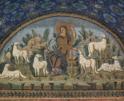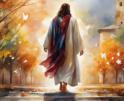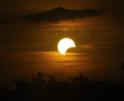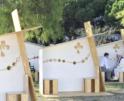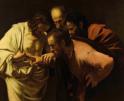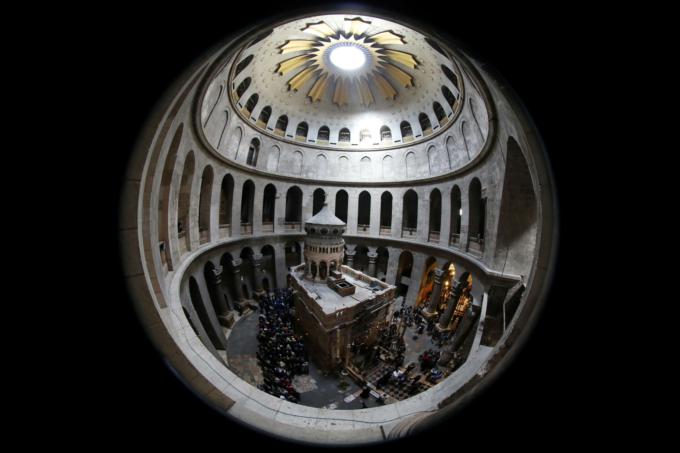
Faith
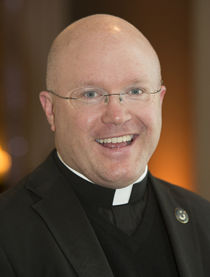
Landry
At the beginning of Lent, I was privileged to help lead a pilgrimage of 40 young adults to the Holy Land.
The pilgrims came from the Leonine Forum, a wonderful program founded in 2013 in Washington DC by the late Father Arne Panula and Mitch Boersma of the Catholic Information Center to form Catholics in their 20s and 30s in Catholic social teaching, assisting them to lead fully-integrated lives of faith at home, in their professions, society and the Church. Last year the Leonine Forum began in New York where I serve as its Chaplain. Later this year it will be expanding to Los Angeles.
For most of the pilgrims it was their first time to follow in Jesus' footsteps in the land he made holy. It was moving for me to witness anew the power of a visit to the Holy Land to strengthen their faith. The Holy Land has been called the "fifth Gospel" and a good pilgrimage there is a life-changing peripatetic retreat in which pilgrims are able to meditate on and liturgically enter into the principal events in the history of salvation.
We celebrated in Nazareth God's entering our world through the fiat of our Lady. We marked in Ein Kerem how Jesus sanctified in utero his cousin John the Baptist. We rejoiced in his birth in Bethlehem, pondered his presentation and finding on the Temple Mount, relived his call of the disciples in Capernaum, contemplated his miracles on and around the Sea of Galilee, listened live to his Sermon on the Mount on the Mount of the Beatitudes where he proclaimed it, climbed up the exceedingly high mountain where he was transfigured before Peter, James and John, visited Bethany where Jesus was welcomed by Martha, Mary and Lazarus, followed him over Mount Zion where he wept over Jerusalem, entered into Jerusalem as he did on Palm Sunday, reflected on the Sacraments of Holy Orders, the Holy Eucharist, Penance and Confirmation he and the Holy Spirit instituted in the Upper Room, prayed with him in the Garden of Gethsemane, followed him to the place of his arrest and condemnation and along the Way of the Cross, climbed Calvary where he died to take away our sins, kissed where he was taken down from the Cross and anointed, and celebrated Mass in the Holy Sepulcher, restoring the Risen Body of the Lord in the Eucharist to the tomb which he emerged on Easter Sunday.
The Masses celebrated at the Holy Sites all have the liturgical rank of solemnities, meaning they have precedence over most other celebrations. We celebrate the Annunciation in Nazareth, Christmas in Bethlehem, the Exaltation of the Cross at Calvary and Easter at the tomb. In seven or eight days one can relive the entire liturgical calendar. There's nothing like it.
One of our pilgrims got up early one day to journey with me to the Church of the Holy Sepulchre at 4. She attended Mass on Calvary, then within the tomb, and later that day with the group at the Grotto of the Shepherds in Bethlehem. Her comment to the group at the end of our trip was that February 22 was the greatest day of her life, having had the awesome gift in Bethlehem to receive the same Jesus Mary loving wrapped in swaddling clothes, on Calvary the Body and Blood given and shed for us on the Cross, and in the tomb, the Risen Body, Blood, Soul and Divinity of Jesus. Her awe was shared by many of her fellow pilgrims as they, too, were able to have the Gospel and the realities of its actualization in time come alive in a way that not only they had never experienced but could not have imagined.
Pilgrimages to the Holy Land, however, are important not just for pilgrims coming from afar. They are crucial for the survival of the Christian community in the Holy Land and for the pilgrimage sites themselves.
This point was made for all of us in an unforgettable way by our great local guide on our last day together. After expressing how moved he was to have led a group of faithful young adult Catholics about his own age, he made clear what all of the pilgrims were inferring in pieces all along the journey: that the Christian community in the Holy Land has been dramatically dwindling in recent decades to such an extent that, with the exception of Bethlehem, the only way the sanctuaries of the Lord can survive as houses of prayer is for pilgrims to come to worship there.
He appealed to all of us to spread the word and invite as many as we could to go on pilgrimage to the Holy Land to support the courageous Christians that are trying to keep the Lord's memory alive in the land of his birth and to ensure that the Holy Land doesn't become just a Biblical museum.
It was a healthy dose of realism from a joyful Melkite Catholic about the situation in the Holy Land that believers everywhere should be aware of and be seeking to remedy.
Christians in the Holy Land -- mainly Melkite and Latin rite Catholics and Greek Orthodox, but also some Maronites, Copts, Armenians, Assyrians, Russian Orthodox, Anglicans, Lutherans and other Protestants -- have been struggling to maintain their presence. When Israel was born in 1948, Christians were 30 percent of the overall population; now they're 1.5 percent. In Jerusalem, where Christians once were a quarter of all residents, there are only 11,000 (of 858,000 inhabitants) who remain. In Bethlehem, which for centuries was an overwhelmingly Christian town, only eighteen percent are now Christian.
There are various reasons for the dramatic decline, but most trace themselves to the ongoing conflict between Israel and the State of Palestine and to the way Christians are treated by the respective Jewish and Muslim majorities. Most Christians in the Holy Land are Arabs, and most Arabs there are Muslim. Muslims generally support fellow Muslims, Jews fellow Jews, and Christians are collateral damage in the ongoing struggle between politicized forms of Judaism and Islam.
For example, there are two public school systems in Israel, one in Hebrew, the second in Arabic, both of which are basically free beyond a small annual inscription fee. In Hebrew schools, Judaism is taught. In Arabic schools, Islam. Christians have fought -- to no avail -- to be able to send their kids to schools in which they are able to learn Christianity or at least not be indoctrinated in another religion. The only option for Christians is to send their children to the great schools run by religious orders, but like private schools anywhere, they're not cheap. That educational reality -- and the price to provide a good education -- is one reason the average Christian family size is considerably smaller than Jewish and Muslim family sizes. It's also why some young Christian families seek to leave.
There are also economic pressures. Most Jews support Jewish-owned businesses and Muslims Muslim-owned businesses. Christian businesses therefore have the odds stacked against them. The consequences of Israel's building a wall around Bethlehem, for example, and making traveling from the Palestinian controlled territories into Israel-controlled territories very onerous -- such that Christians living in Bethlehem but working in Jerusalem, if they're lucky enough to get the rare permits to cross the checkpoints, need to leave about 3:30 in order to arrive at work for 9:00 six miles away with minimal traffic -- make it very difficult for workers and Christian-owned businesses. Many have understandably found it easier to leave the country so that they can live and work on a level playing field rather than in what is essentially an "open air prison."
Then there are the political issues. There are Muslim fundamentalists who do to Christians, their homes and places of worship in the Holy Land what happens in other parts of the Middle East, often with impunity. And Jewish authorities often engage in blatant discrimination against non-Jews in general and Christians in particular.
On the last day I was in Jerusalem, the Church of the Holy Sepulcher -- enclosing both Calvary and Jesus' empty tomb-- was closed, in joint agreement by the leaders of the Orthodox, Catholic, and Armenian Churches to protest two things. The first is the unilateral decision of the Mayor of Jerusalem retroactively to tax Church properties that are not used for worship -- like schools and pilgrims residences -- to the tune of millions of dollars, despite the fact that the agreement in the Holy Land for centuries is that the Churches wouldn't be taxed, because schools carry out part of their mission, and residences allow people to come to pray and provide some income to help the Churches pay their bills. No warning was given, nor any intelligible rationale and calculus for the bills. The second cause was a bill in the Israeli parliament (Knesset) to confiscate former Church properties that have been sold, something that would obviously prevent the Church from ever selling other property if financial needs warranted. Such actions targeted only Christians.
After three days Prime Minister Benjamin Netanyahu intervened and got the Jerusalem mayor to withdraw his tax plan and the Knesset to suspend voting on the bill. But it's clear that the Christian leaders felt that they had no alternative but to raise an international outcry by closing the holiest place in Christianity -- reluctantly shutting out pilgrims who had come to Jerusalem precisely to venerate the place where Christ died and rose -- until their legitimate complaints were heard by those in the nearby Mayor's Office and Knesset.
Christians in other places of the Middle East -- where they often have no right to worship, are legally second class citizens, and are even put to death by certain fundamentalist groups or rogue actors -- have been treated much more poorly than in the Holy Land. But that doesn't minimize the real struggles the Christian community has in the Holy Land. They deserve to be supported. Pilgrimages give them much support, as Christians from around the world are able to familiarize themselves with their plight -- which doesn't often get transmitted through the secular media -- where they have the chance to support their businesses, and where they can help them keep the memory of Christ's life and ongoing work alive.
What about making a pilgrimage to the Holy Land? It's totally safe. It will both strengthen you in faith and strengthen the Church where Christ first established it.
- Father Roger J. Landry is a priest of the Diocese of Fall River, Massachusetts, who works for the Holy See’s Permanent Observer Mission to the United Nations.
Recent articles in the Faith & Family section
-
Scripture Reflection for April 21, 2024, Fourth Sunday of EasterJem Sullivan
-
The new Temple: How Easter changes religionDr. R. Jared Staudt
-
The wonder of Ordinary TimeLucia A. Silecchia
-
Is there still responsibility for past sins after confession?Jenna Marie Cooper
-
Wounds, not scarsJaymie Stuart Wolfe

